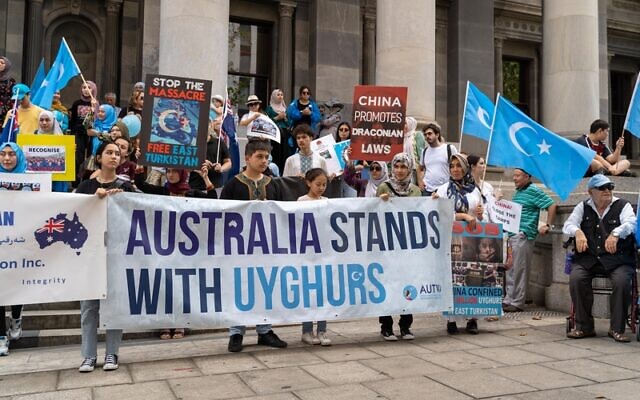A moral imperative to speak out for the Uyghurs
'Given the history of the Jewish people, there is a moral imperative for us to speak out'.
WITH the liberation of the Nazi concentration camps at the end of WWII, the horrors of the Holocaust were fully apparent. If you ask members of our community to identify the critical lesson, a likely response is “Never Again”.
At a minimum this means not being silent, not looking away, but calling out and intervening whenever major ethno-national or religious persecution occurs.
Given the history of the Jewish people, there is a moral imperative for us to speak out. To that end, the Australian Jewish Association (AJA) held a virtual event on December 2 with Ramila Chanisheff, president of the Australian Uyghur Tangritagh Women’s Association, an intelligent and courageous woman who has become by default an advocate for the Uyghurs suffering under Chinese Communist Party (CCP) authority.
It is estimated more than 1,500,000 Uyghurs in East Turkistan, also known as Xinjiang Province, have been rounded up by CCP officials into re-education, detention, or concentration camps.
While the Holocaust stands alone in nature and magnitude, there are some disturbing characteristics of what is happening to the Uyghurs today which are reminiscent of the Holocaust.
The Australian Strategic Policy Institute (ASPI) estimated in September 2020 that there are 380 suspected detention facilities in Xinjiang based on evidence including analysis of satellite imagery.
In July last year, US Customs and Border Protection intercepted a 13-ton shipment from China of products suspected of being made of human hair harvested from Uyghurs. A CNN investigation found a website in China openly selling Uyghur hair.
Nury Turkel, US commissioner on International Religious Freedom, spoke in September of a deliberate Chinese policy to “stamp out Uyghurs’ ethno-national identity”. Allegations have emerged of Uyghur families being forcibly separated, Uyghur mosques, cultural and community facilities being destroyed, and children sent to schools for focused Chinese-only education.
Investigative journalists have taken videos of Uyghur children singing and calling out slogans of loyalty to the Chinese communist leaders and regime. Official Xinjiang figures show a decline in the Uyghur birth rate although Chinese authorities deny forced sterilisations.
There are harrowing testimonies of some who have left detention facilities, often dual nationals who have made it into Kazakhstan or Turkey. They relate their experiences of family separations, forced or slave labour and intense re-education. The Turkic language and Uyghur culture are prohibited and replaced by Han Chinese and the need for complete CCP loyalty. There are firsthand reports of gross mistreatment of the detained Uyghurs including rapes and torture.
The allegations and evidence of an organ-harvesting industry in China are particularly chilling. Radio Free Asia has reported in detail of the conversion of a hospital into a detention facility in Aksu in China’s Xinjiang Uyghur Autonomous Region. Analysis of images suggest the creation of a “green corridor” for possible rapid transport of organs to Aksu airport as well as construction of a nearby crematorium and cemetery.
In mid-2019 an independent tribunal sitting in London concluded that the killing of detainees in China for organ transplants is occurring. The China Tribunal chaired by Sir Geoffrey Nice QC, a prosecutor at the international criminal tribunal for the former Yugoslavia, delivered a unanimous conclusion of forced organ harvesting. Falun Gong and Uyghur former inmates gave testimony of undergoing repeated medical testing. Waiting times for transplantation offered by hospitals in China were extraordinarily low, the tribunal noted, often only a couple of weeks.
Although Uyghurs are predominantly Muslims, not one Islamic country has offered asylum to their brethren in China. Why? The only explanation we have received is, as Australia is experiencing, China has considerable economic muscle and is prepared to use it aggressively.
Many of the detention facilities are located nearby major manufacturing plants where goods are produced for export to Western consumers. An Australian Strategic Policy Institute report has identified 83 major brands implicated in the use of forced labour in Xinjiang. Industries involved include clothing and fashion, footwear, electronics, motor vehicle parts and others.
This matter has become an issue for Australian legislators. Draft legislation spearheaded by Senator Rex Patrick would ban products made by Uyghur slave labour. On December 10, the Senate referred the Customs Amendment (Banning Goods Produced By Uyghur Forced Labour) Bill 2020 to the Senate Foreign Affairs, Defence and Trade Legislation Committee for inquiry. AJA is the only Jewish organisation to have made a submission.
When the AJA event was held on December 2, it was attacked by one of the “Zoom-bomb” techniques. During the event we received hundreds of obscene, abusive messages. Who would do this? We have been advised that local “ChiComs” are very active and well resourced and the sort of people in Australia loyal to the CCP who would disrupt a demonstration in support of Hong Kong democracy on any of our university campuses, were the likely culprits.
We continue to work closely with Uyghur community representatives in Australia and I was privileged to be invited to address their major annual Turkic new year event in Adelaide on March 21 and pledge publicly our commitment of support. AJA has also been advocating for action to parliamentarians.
Numerous aspects of what is happening to the Uyghur community in China is clearly in breach of the Universal Declaration of Human Rights and therefore a crime against humanity. So, it is also nothing short of disgraceful that on October 14, 2020, China was re-elected to the UN Human Rights Council.
Dr David Adler is president of the AJA.


comments